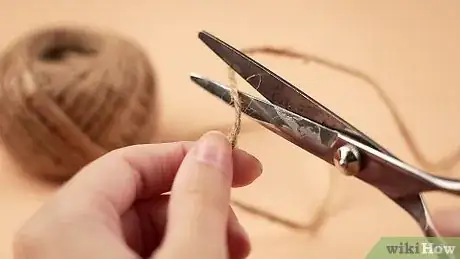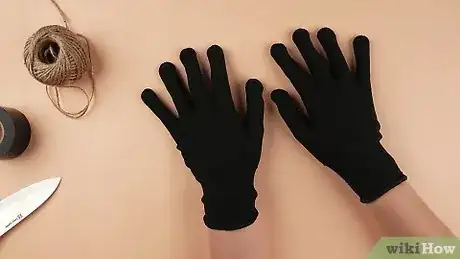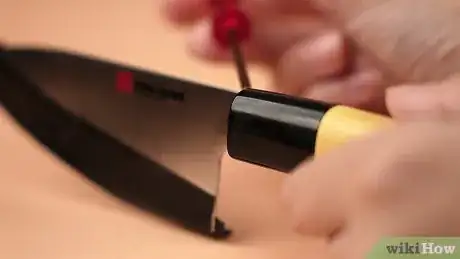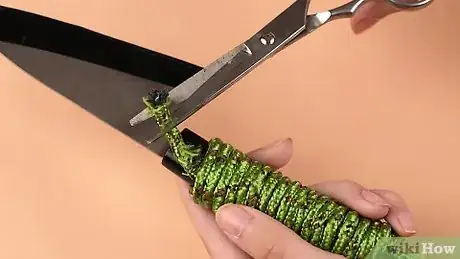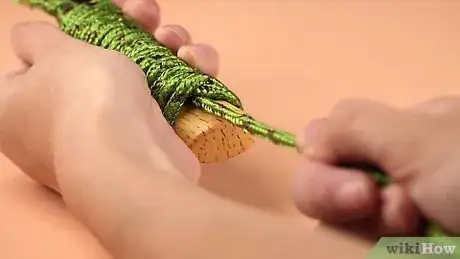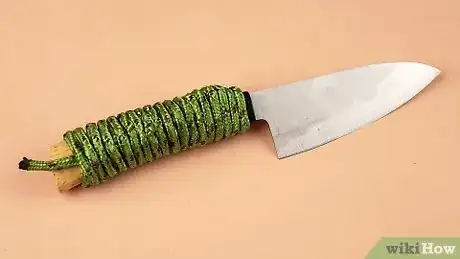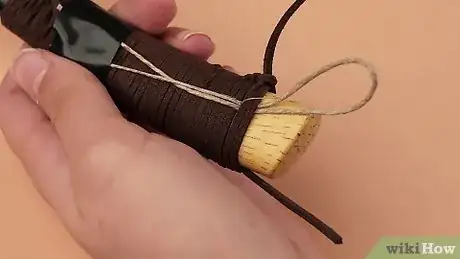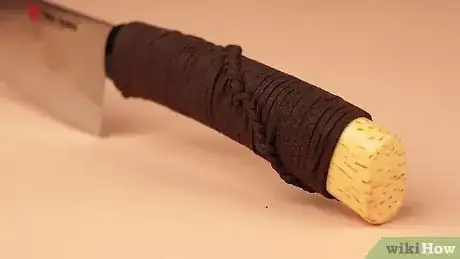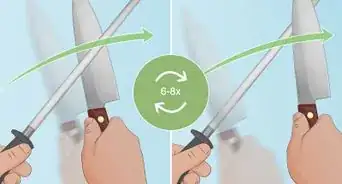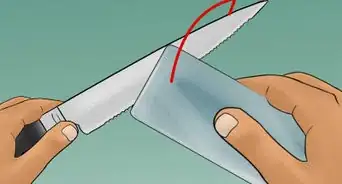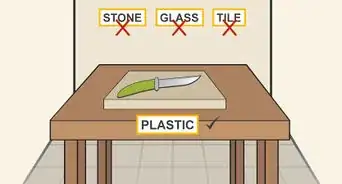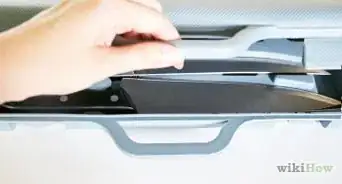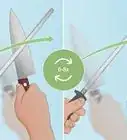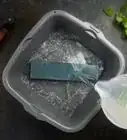This article was co-authored by Marrow Private Chefs and by wikiHow staff writer, Janice Tieperman. Marrow Private Chefs are based in Santa Rosa Beach, Florida. It is a chefs’ collaborative comprised of an ever-growing number of chefs and culinary professionals. Though regionally influenced primarily by coastal, traditional southern, cajun, and creole styles and flavors, the chefs at Marrow have a solid background in all types of cuisine with over 75 years of combined cooking experience.
There are 25 references cited in this article, which can be found at the bottom of the page.
This article has been viewed 80,749 times.
A small, sturdy knife is an essential item to take with you on your outdoor journeys, but you definitely don’t want to deal with an unwrapped metal handle when you’re out adventuring. Not to worry—it’s super easy to wrap up your knife handle with a length of paracord 550 or a long leather strip. We’ll walk you through everything you need to know, along with a couple of basic wraps that you can try. In just a few minutes, your blade will be ready to go!
Things You Should Know
- Use at least 1 ft (30 cm) of material for every 1 in (2.5 cm) of handle you plan on covering.
- Wear gloves and wrap the blade with duct tape to protect your hands.
- Loop the cord repeatedly around the entire handle to create a simple wrap.
- Thread loops of cord over your knife handle to create a cool spiral design.
Steps
Cord and Knife Prep
-
1Measure at least 4 ft (1.2 m) of leather cord or paracord 550 to cover your knife handle. Set aside at least 1 ft (30 cm) of material for every 1 in (2.5 cm) of knife handle you need to cover up. When in doubt, it’s always better to have a little too much paracord or leather rather than not enough.[1]
- For instance, 4 ft (1.2 m) of material would be a good amount to cover a 3.75 in (9.5 cm) knife handle.
- You could instead use butcher's twine to wrap your knife for extra grip.
-
2Soak any leather cord in water for 45 minutes so it’s easier to work with. The leather may look a bit larger as it soaks, but it’ll shrink back down to its normal size once it dries. [2]
- Feel free to skip this step if you’re working with paracord.
Advertisement -
3Slip on a pair of gloves to protect your hands. Grab a thick pair of work or gardening gloves that can hold up against any accidental encounters with your knife’s blade.[3]
-
4Wrap the blade in duct tape so you don’t cut yourself later on. Hold the unwrapped blade really carefully in one hand, using your other hand to wrap a long strip of duct tape around the entire length of the blade. Be sure to cover the tip of the blade with tape, too—you don’t want to hurt yourself accidentally while you’re wrapping the knife.[4]
- Unpeel the duct tape slowly and carefully once you’ve finished wrapping up your handle. Be careful not to cut yourself!
-
5Unscrew the outer handle slabs from your knife handle if there are any attached. Grab a screwdriver that matches the hardware attached to your handle slabs. Set aside any screws and bolts that you remove, along with the slabs (in case you’d like to reattach them later on).[5]
- You don’t have to remove your existing handle slabs—you just might need a little more cord since you’ll be wrapping around a wider circumference.
Simple Wrap
-
1Extend a length of cord down along the handle so it stretches onto the base of the blade. Starting from the base of the handle, extend the paracord or leather strip so it goes 1 to 2 in (2.5 to 5.1 cm) over the taped base of the blade. Leave a 6 in (15 cm) section hanging off the bottom of the handle—this will make it easier for you to secure your wrap later on.[6]
- Alternatively, you can use adhesive tape meant for wrapping knife handles.
-
2Loop the working end of the cord down to the base of the handle. Bend the cord or leather strip right where you left it—about 1 to 2 in (2.5 to 5.1 cm) overlapped on the base of the blade. Then, extend this second section of cord down so it’s completely parallel with the first strand.[7]
-
3Wrap the working section of cord around the base of the handle completely. Pull the cord around the back of the knife handle and back over the top, creating a tight loop.[8]
- Make sure that you’re wrapping the paracord or leather strip in a clockwise direction.
-
4Continue tightly wrapping the cord all the way up the length of the handle. Make another clockwise loop, ensuring that it’s nice and snug against the base loop. Then, keep wrapping the working cord around the handle, making the loops nice and tight as you go. Continue on until you reach the guard beneath the blade.[9]
- The guard is a little wider than the rest of your knife handle. If your blade doesn’t have a guard, just keep going until you’ve covered the entire handle.
-
5Thread the leftover working cord through the loop at the top of the handle. Stick the end of the cord through the front of the loop, moving from front to back as you go. Pull on the end of the cord to shrink the loop and make it tight.[10]
-
6Trim off the extra cord and leave a 1 to 2 in (2.5 to 5.1 cm) tail. Chances are, you still have a good amount of working cord attached to your handle—just snip this off with a pair of scissors, leaving a small tail sticking out from the top of the handle.[11]
- Feel free to melt this end of the cord if you’re working with paracord. This helps it from unraveling.[12]
- If you’re working with leather cord, you might have an easier time with an X-ACTO knife.
-
7Tug the cord at the base of the handle and pull the top loop under the wrap. Grab the 6 in (15 cm) section of cord that you left dangling at the very bottom of your knife handle. Firmly pull on this end to pull the top loop under and beneath the layer of wrapped cord. Just be sure not to pull the loop out through the bottom of the handle, or else you’ll completely unravel all of your hard work.[13]
- If the loop gets lodged in place, nudge it forward by sticking a flathead screwdriver through the tightly-wrapped sections of cord on your knife handle.
-
8
Spiral Wrap
-
1Make a half-knot along the top of your handle. Place your length of leather or paracord beneath the base of your handle. Then, twist both ends around one another and tug them taut without tying a knot on top.[15]
-
2Drape the tail end of the cord down the base of your handle and band it in place. Grab the shorter, working end of your cord and tug it down so it’s parallel with the handle. Then, stick a small elastic band over the tail of the cord.[16]
- This vertical length cord acts as the base of your wrap. You’ll be wrapping the remaining cord over and on top of it to create a spiral.
-
3Create a loop with the working cord and thread it onto the handle. Grab the working end of your cord and form a basic loop with the cord—it should be just big enough to fit over your knife’s handle.[17] Then, push the loop all the way down the handle and pull on the working end of the cord so it stays in place.[18]
- Notice the uneven and twisted section of cord along your knife’s handle? With enough loops, this portion of cord eventually creates a spiral effect.
-
4Keep sliding and tightening loops along the handle until it’s about 90% covered. Form another loop, pushing it over and along the base of your knife so it’s snug and tight next to the previous one. The loop looks slightly offset from the others, which creates a gradual spiral.[19]
-
5Tape a loop of thread on top of your leather-wrapped handle. Cut a long section of thread and loop it in half—when folded, it needs to be at least half as long as your knife handle. Arrange the thread so the loop faces the base of the handle. Then, tape the thread in place along the upper portion of the handle (closer to the blade).[20]
- Make sure to layer the thread on top of the cord you’ve already threaded onto the handle.
- This thread helps you pull the tail end of the cord beneath the rest of the wrapping. It’s especially helpful if you’re working with leather cord.
-
6Slide and tighten 3-4 more loops onto the handle to finish up your wrap. Repeat the same looping, sliding, and tightening process that you did before—just make sure that the new loops go on top of the thread. [21]
-
7Thread the cord through the thread loop and tug on the end. Slide the working end of your cord through the thread loop along the bottom of the handle.[22] Then, grab the taped ends of the thread and pull upwards, forcing the tail end of the cord to slide beneath the last few loops of cord that you just wrapped.[23]
- Feel free to trim down the tail with an X-ACTO knife or pair of scissors first if there’s a lot of leftover material.
-
8Slice off both tail ends of cord with an X-ACTO knife. Look for 2 tail ends dangling from the base of your wrap—the long section that you secured at the beginning with an elastic band, and the short end that you just pulled with the thread. Grab an X-ACTO knife and cut off these ends along the edge of the bottom loop.[24]
- At this point, feel free to remove the tape and thread still attached to your handle.
Expert Q&A
-
QuestionWhat is the best material to wrap a knife handle in?
 Marrow Private ChefsMarrow Private Chefs are based in Santa Rosa Beach, Florida. It is a chefs’ collaborative comprised of an ever-growing number of chefs and culinary professionals. Though regionally influenced primarily by coastal, traditional southern, cajun, and creole styles and flavors, the chefs at Marrow have a solid background in all types of cuisine with over 75 years of combined cooking experience.
Marrow Private ChefsMarrow Private Chefs are based in Santa Rosa Beach, Florida. It is a chefs’ collaborative comprised of an ever-growing number of chefs and culinary professionals. Though regionally influenced primarily by coastal, traditional southern, cajun, and creole styles and flavors, the chefs at Marrow have a solid background in all types of cuisine with over 75 years of combined cooking experience.
Private Chefs Lots of people have different preferences when it comes to this. Some prefer a smooth handle, while others like to have some additional grip. There are several different adhesive tapes available online made specifically for the purpose, but you can use paracord or even butcher’s twine to give it a little extra grip.
Lots of people have different preferences when it comes to this. Some prefer a smooth handle, while others like to have some additional grip. There are several different adhesive tapes available online made specifically for the purpose, but you can use paracord or even butcher’s twine to give it a little extra grip. -
QuestionDoes wrapping in leather basically mirror the wrapping with paracord other than the preparation?
 wikiHow Staff EditorThis answer was written by one of our trained team of researchers who validated it for accuracy and comprehensiveness.
wikiHow Staff EditorThis answer was written by one of our trained team of researchers who validated it for accuracy and comprehensiveness.
Staff Answer wikiHow Staff EditorStaff AnswerYes! The other main difference is how you finish off the wraps. Paracord wraps can be melted at the ends with a lighter, while leather wraps need to be tucked under the rest of the wrap.
wikiHow Staff EditorStaff AnswerYes! The other main difference is how you finish off the wraps. Paracord wraps can be melted at the ends with a lighter, while leather wraps need to be tucked under the rest of the wrap.
Things You’ll Need
Cord and Knife Prep
- Paracord 550 or leather cord
- Gloves
- Duct tape
- Screwdriver (optional)
Simple Wrap
Spiral Wrap
- Tape
- Thread
- X-ACTO knife
References
- ↑ https://www.bladehq.com/blog/easy-paracord-wrap-knife-handle/
- ↑ https://leatherhandy.com/how-to-leather-wrap-a-knife-handle/
- ↑ https://www.youtube.com/watch?v=IWirpsWMpoE&t=1m21s
- ↑ https://www.youtube.com/watch?v=PAFBkMhMCiw&t=0m28s
- ↑ https://www.youtube.com/watch?v=IWirpsWMpoE&t=2m9s
- ↑ https://www.youtube.com/watch?v=IWirpsWMpoE&t=3m5s
- ↑ https://www.youtube.com/watch?v=IWirpsWMpoE&t=3m8s
- ↑ https://www.youtube.com/watch?v=6znBYkRVr8Y&t=3m19s
- ↑ https://www.youtube.com/watch?v=6znBYkRVr8Y&t=3m28s
- ↑ https://www.youtube.com/watch?v=6znBYkRVr8Y&t=4m2s
- ↑ https://www.youtube.com/watch?v=IWirpsWMpoE&t=3m27s
- ↑ https://www.youtube.com/watch?v=6znBYkRVr8Y&t=4m45s
- ↑ https://www.youtube.com/watch?v=IWirpsWMpoE&t=3m37s
- ↑ https://www.youtube.com/watch?v=6znBYkRVr8Y&t=6m32s
- ↑ https://www.youtube.com/watch?v=BalSbJUR68I&t=0m48s
- ↑ https://www.youtube.com/watch?v=BalSbJUR68I&t=0m50s
- ↑ https://www.youtube.com/watch?v=BalSbJUR68I&t=1m2s
- ↑ https://www.youtube.com/watch?v=BalSbJUR68I&t=1m6s
- ↑ https://www.fouroakscrafts.com/make-hiking-stick-paracord-wrap/
- ↑ https://www.youtube.com/watch?v=BalSbJUR68I&t=1m24s
- ↑ https://www.youtube.com/watch?v=BalSbJUR68I&t=1m33s
- ↑ https://www.youtube.com/watch?v=BalSbJUR68I&t=1m39s
- ↑ https://www.youtube.com/watch?v=BalSbJUR68I&t=1m41s
- ↑ https://www.youtube.com/watch?v=BalSbJUR68I&t=1m47s
- ↑ https://www.youtube.com/watch?v=IWirpsWMpoE&t=1m2s
- ↑ https://www.fouroakscrafts.com/make-hiking-stick-paracord-wrap/
